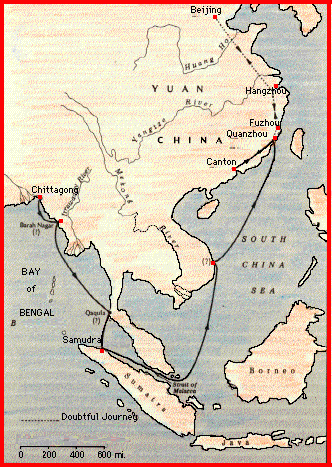He admired much that he saw. He observed that "silk is used for clothing even by poor monks and beggars" and that the porcelain was "the finest of all makes of pottery." Even the poultry amazed him: "The hens ... in China are ... bigger than geese in our country."
But he seems to have been in culture shock - discomfort at being in a culture he didn't understand or appreciate.
"China was beautiful, but it did not please me. On the contrary, I was greatly troubled thinking about the way paganism dominated this country. Whenever I went out of my lodging, I saw many blameworthy things. That disturbed me so much that I stayed indoors most of the time and only went out when necessary. During my stay in China, whenever I saw any Muslims I always felt as though I were meeting my own family and close kinsmen." [Dunn, p. 258]
China was not a Muslim country and the cultural differences he encountered offended him.
"The Chinese themselves are infidels who worship idols and burn their dead like the Hindus . . . eat the flesh of swine and dogs, and sell it in their markets."
Ibn Battuta had arrived in the last peaceful years before the collapse of the Mongol (Yuan dynasty) rule. He noted,
"China is the safest and most agreeable country in the world for the traveler. You can travel all alone across the land for nine months without fear, even if you are carrying much wealth."
Ibn Battuta describes a trip on the Grand Canal to Beijing, capital of Mongol China. But his description is so vague that most historians believe that he didn't really make the trip. (His book about his travels was more of a "travelogue" of the Islamic World, so perhaps he or the person who wrote down his stories exaggerated by filling in with hearsay and stories reported by other people. This was not an uncommon practice among traveller-writers at the time.)
Ibn Battuta reported meeting a rich Muslim trader who lived in Hangzhou which may have been the largest city in the world during the 14th century. He tells of staying with the Egyptian Muslim for a few weeks as he enjoyed banquets, canal rides, and magic shows. In Fuzhou he met someone whom he met when he passed through India. Now this man was rich. He "owned about fifty white slaves and as many slave-girls, and presented me with two of each, along with many other gifts."
When Ibn Battuta got back to Quanzhou he found a junk belonging to the Sultan of Samudra ready to go back. So he got on board and began his return home. In three years he would be walking the streets of his hometown Tangier, Morocco and describing his adventures throughout the Dar al-Islam (and beyond).


